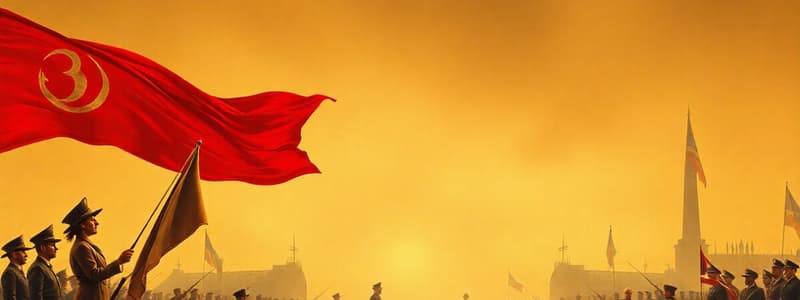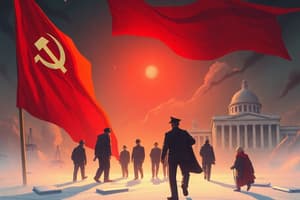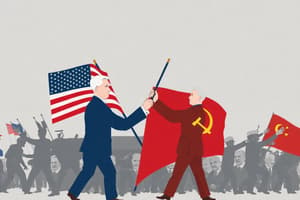Podcast
Questions and Answers
What is the primary belief of capitalism?
What is the primary belief of capitalism?
- Equal distribution of resources
- Government-controlled economy
- Individual ownership and competition (correct)
- Collective ownership
Who is considered a key theorist of capitalism?
Who is considered a key theorist of capitalism?
- Adam Smith (correct)
- Vladimir Lenin
- Mao Zedong
- Karl Marx
What is the main idea behind the communist economic system?
What is the main idea behind the communist economic system?
- Private property rights
- Individual profit
- Free market competition
- Collective ownership and planned economy (correct)
In a communist system, how are resources typically distributed?
In a communist system, how are resources typically distributed?
What does an economic system primarily involve?
What does an economic system primarily involve?
What happens to the material needs of society, according to Adam Smith's capitalist theory?
What happens to the material needs of society, according to Adam Smith's capitalist theory?
In the candy trading exercise, what do students determine?
In the candy trading exercise, what do students determine?
What is the purpose of the sharing group activity with candies?
What is the purpose of the sharing group activity with candies?
Flashcards
Economic System
Economic System
An economic system is how a society produces, exchanges, and allocates resources.
Capitalism
Capitalism
An economic system based on individual ownership, competition, and profit.
Capitalism Theory
Capitalism Theory
Believes in individual ownership and competition.
Adam Smith
Adam Smith
Signup and view all the flashcards
Communism
Communism
Signup and view all the flashcards
Communism Theory
Communism Theory
Signup and view all the flashcards
Ideological Impact
Ideological Impact
Signup and view all the flashcards
Long-term effects of conflict
Long-term effects of conflict
Signup and view all the flashcards
Study Notes
- Cycle 5 Meeting 4 relates to the prevailing ideologies and the Cold War.
- Understanding that ideological developments affect people's lives and the environment in societies is key.
- Understanding that conflict and violence have long-term societal effects is key.
- Understanding that military and nuclear power has affected worldwide conflict and cooperation patterns is key.
- Understanding that conflict resolution can involve aggression, compromise, cooperation, and change is key.
- Essential questions address how political and economic ideologies have shaped world events.
- Essential questions address when conflict becomes global.
- Essential questions address whether the USA has become a dominant force in the 20th century.
Trade or Share Activity
- Divide the class into two groups to complete the following tasks.
- The Trading Group would give each student a few candies to trade or sell to other students in their group.
- The Trading Group would have to decide the value and rules for trading.
- The Sharing Group would collect all the candies from the group into a common bowl.
- The Sharing Group would distribute the candies equally among all members of the group.
- Processing questions examine feelings about trading or sharing and preference.
- Processing questions ask how these concepts apply in the real world.
- Processing questions address how these systems might impact motivation to work or contribute.
Economic Systems
- An economic system involves the production and exchange of goods and services and allocating societal resources.
- Communism and Capitalism are two major economic systems.
Capitalism
- Capitalism believes in individual ownership and competition.
- The capitalist theory states that if everyone is selfish and seeking personal profit, everyone will benefit.
- Adam Smith was a capitalist who stated that humans are self-serving by nature.
- Smith says that as long as every individual seeks the fulfillment of their own self-interest, the material needs of society will be met.
- Smith wrote Wealth of Nations and thought Capitalism was good for society and the best economic system.
Pros of Capitalism
- Freedom and choice are pros of capitalism.
- Individuals can work wherever, buy whatever, and do whatever.
- There is opportunity to be very successful, such as Bill Gates-level success.
- “Survival of the fittest” only applies to Capitalism.
Cons of Capitalism
- No safety net.
- Failure results in not being rescued by the government.
- Individuals can be very unsuccessful.
- There is typically a big gap between rich and poor.
Communism
- Communism believes in collective ownership and a planned economy.
- In a planned economy, the government makes the decisions.
- The communist theory states that everyone pools their resources and distributes everything evenly.
- Everyone gets an equal amount of everything, regardless of effort.
- Karl Marx was a communist who condemned capitalism as a system that alienates the masses.
- He wrote The Communist Manifesto with Engels about class struggle and the problems of capitalism.
Pros of Communism
- Security and basic needs are met.
- Everyone would ideally have a job, house, health care, etc.
- No survival of the fittest issue applies in communism.
- In communist regimes, people are treated equally by the government regardless of education, financial standing, etc.
- Economic boundaries do not categorize people, helping mitigate crime and violence.
Cons of Communism
- Lack of choice.
- No reward for being a better worker.
- Those who are slackers get no punishment.
- There is a lack of incentives and consequences.
- Everyone is expected to be the same.
- There is a lack of focus on individual growth.
Studying That Suits You
Use AI to generate personalized quizzes and flashcards to suit your learning preferences.




